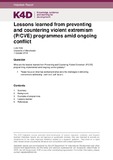| dc.contributor.author | Kelly, Luke | |
| dc.date.accessioned | 2019-10-22T08:56:03Z | |
| dc.date.available | 2019-10-22T08:56:03Z | |
| dc.date.issued | 2019-10-01 | |
| dc.identifier.citation | Kelly, L. (2019). Lessons learnt from Preventing and Countering Violent Extremism (P/CVE) programmes amid ongoing conflict. K4D Helpdesk Report 668. Brighton, UK: Institute of Development Studies. | en |
| dc.identifier.uri | https://opendocs.ids.ac.uk/opendocs/handle/20.500.12413/14746 | |
| dc.description.abstract | This review finds that there is relatively little evidence on what has worked in preventing and countering violent extremism (P/CVE) in conflict settings. Overall, there is stronger evidence for programmes that seek to counter violent extremism among at risk populations, than for those that seek to prevent violent extremism by reducing the structural drivers. However, this review found a weak evidence base, and a lack of agreement on the best way to prevent and counter violent extremism in these contexts (Holmer, Bauman, & Aryaeinejad, 2018). It therefore discusses understandings of P/CVE and the evidence base in section 2, before highlighting some of the evidence from programmes and the lessons learned in sections 3 and 4. The review includes lessons from countries with low level or latent conflict and post-conflict settings. Push and pull factors are widely used to understand the risk that individuals might take up violent extremism. However, the review has found several difficulties cited with this approach. First, some authors suggested that existing programmes did not always accurately assess the push and pull factors in given contexts (Romaniuk & Durner, 2018). Other authors questioned the approach of addressing push and pull factors, in favour of considering the structural factors driving conflict (Attree, 2017). Such authors therefore advocate integrating P/CVE efforts with peacebuilding efforts in security contexts. However, some studies showed positive results in addressing individual push or pull factors. For instance, a study of programming used to increase participants' 'value complexity' (i.e. ability to acknowledge and understand multiple values and views) in Kenya showed positive results and has been replicated in other contexts, although not in conflict contexts (Nemr and Savage, 2019). However, this review found that understanding how push and pull factors worked in a specific context was very important. In particular, ‘CVE-relevant’ programming, i.e. addressing push factors, did not always address VE effectively. For example, Aldrich's study (2012) of USAID programming in the Sahel showed that radio and USAID programmes effectively increased listeners' civic engagement. However, it did not have any effect on listeners' willingness to support VE, which had been expected to follow from increased civic engagement. | en |
| dc.language.iso | en | en |
| dc.publisher | IDS | en |
| dc.relation.ispartofseries | K4D Helpdesk Report;668 | |
| dc.rights.uri | https://www.nationalarchives.gov.uk/doc/open-government-licence/version/3/ | en |
| dc.subject | Governance | en |
| dc.subject | Rights | en |
| dc.subject | Security and Conflict | en |
| dc.title | Lessons Learned from Preventing and Countering Violent Extremism (P/CVE) Programmes Amid Ongoing Conflict | en |
| dc.type | Helpdesk | en |
| dc.rights.holder | © DFID - Crown copyright 2019 | en |
| dcterms.dateAccepted | 2019-10-01 | |
| rioxxterms.funder | Department for International Development, UK Government | en |
| rioxxterms.identifier.project | K4D | en |
| rioxxterms.version | VoR | en |
| rioxxterms.funder.project | 238a9fa4-fe4a-4380-996b-995f33607ba0 | en |

